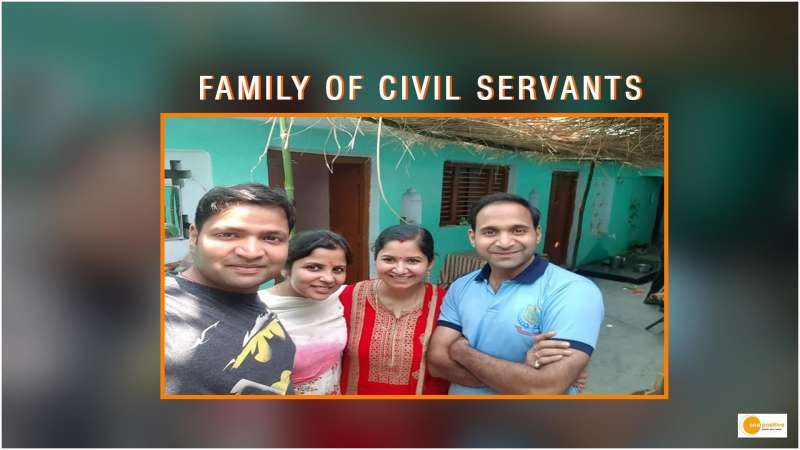The Mishras gathered in their hometown of Lalganj, Uttar Pradesh, during Raksha Bandhan 2012. Sisters Kshama and Madhavi were the most depressed of the four siblings, having failed to pass the UPSC CSE exams, the results of which had been released a day earlier. Yogesh, their brother, could not bear seeing them sad and decided to assist them.
As a Raksha Bandhan present, the then-software engineer decided to take the UPSC himself, figure out what was wrong, and guide his sisters accordingly.
He quit his job in 2013 and spent a year solely focused on UPSC. The following year, he cleared it in the first attempt and became an IAS officer.
With his understanding of the exams and notes, he tutored his two sisters and younger brother. Madhavi passed the exam and was appointed as an IAS officer in 2015. Kshama and Lokesh both passed the exam the following year and are now IPS and IAS officers, respectively.
In an interview with The Better India, Lokesh, the youngest, says that growing up in Lalganj, a village in the 1980s and 1990s, in a lower middle class family, the UPSC was a dream government service. But, while their parents always encouraged them to take the exam, they never imposed their ambitions on their children.
All four siblings studied till Class 12 in a Hindi-medium school. Yogesh went to Motilal Nehru National Institute of Technology in Prayagraj for his engineering. He harboured no interest in UPSC and went on to work in a software company in Noida. But when his sisters, who aspired to clear the civil services exam. faced hurdles, he jumped into the fray himself.
‘Understanding the syllabus key to cracking the exam.’
He says that the turning point for him was the change in the UPSC exam pattern in 2011. The CSAT (Civil Services Aptitude Test) was introduced that year as a part of the UPSC CSE.
“A change in exam pattern is always good for new entrants, as it creates a level playing field for everyone. When I decided to write the exam, the CSAT had been introduced just two years before. CSAT includes aptitude, reasoning, and analytical questions. I felt that it was the hurdle due to which my sisters weren’t able to clear the exams and decided to give it a shot myself,” he explains.
He pored over notifications given by the Examination Commission over the past few years to understand what they expected and why they changed the pattern.
“I also accessed all possible papers to understand the thinking of the Commission and expectations from students. I also had a level playing field as CSAT was new for everyone. I prepared my own notes and managed to clear the exam,” Yogesh, now a 2014-batch IAS officer posted in Shahjahanpur with the Ministry of Defence, says.
He then shared his notes and tricks with his sisters.
He claims that his sister Madhavi, who passed the following year, outperformed him. Meanwhile, Lokesh received an even higher ranking.
Madhavi is the Development Commissioner (DC) of Ramgarh in the state of Jharkhand. Meanwhile, Lokesh is the Deputy Development Commissioner (DDC) of Koderma in Jharkhand, and Kshama is the
Commandant of the Karnataka State Reserve Police’s 3rd battalion (KSRP).
“Each year, I was able to coach my siblings better as I gained a better understanding. I was able to fine-tune my notes and teaching methods. That’s why Lokesh secured an even better ranking,” says Yogesh.
Lokesh explains, “I did my engineering from IIT-Delhi and worked for two years before attempting UPSC. Seeing my siblings clear the exam, I, too, wanted to give it a shot. Besides, I had the advantage of having a good teacher in my brother.”
All four siblings have made their parents and village proud
“Our children have always been very hard-working and honest. After writing an exam, they would tell us if it was good or not. They’ve been rewarded for their perseverance,” says Krishna Mishra, mother of the siblings.
Today, the siblings have set up a coaching centre called Glory IAS, where they guide students. Yogesh, who is leading the initiative, says he has helped more than 100 people clear their UPSC exams in the past 7-8 years. They offer personal one-to-one guidance.
“I think the most important thing needed for clearing the exam is practical guidance and genuine feedback from an expert. In my case, I had an expert at home. My brother would keep checking my papers and guiding me. He told me where I was going wrong, which helped me improve,” says Lokesh.
They have also launched a YouTube channel Glory IAS, where they post tips and tricks to help aspirants.
“In today’s world, resources are widely available, as is knowledge. However, personal guidance is very important to clear the UPSC. Understanding the syllabus is of paramount importance. Due to the paucity of time, we are able to teach a few candidates. To help more people, we’ve launched a YouTube channel,” says Yogesh.
His aim is to create more IAS and IPS officers from small towns and villages, like theirs.


